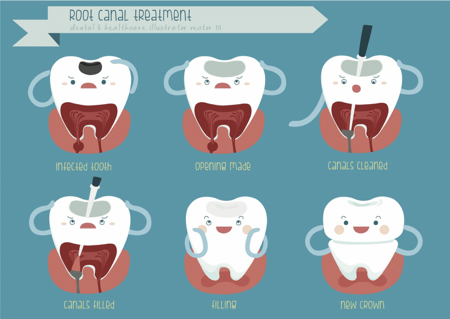For your parents, hearing a dentist say, “you need a root canal” would have sent shivers down their spines. However, nowadays, root canals are nothing to fear. A root canal is a very common solution to a specific type of tooth damage. This article will explain the causes of the damage and why a root canal is beneficial.
Causes
Damaged roots and damaged pulp chamber (the hollow space in the middle of the tooth with nerves, blood vessels and connective tissue) are caused by three main reasons.
- Poor oral hygiene, not keeping up to scratch with your teeth cleaning.
- Eating plenty of sugary foods, normally in conjunction with not regularly and thoroughly cleaning our teeth.
- Injury. Unfortunately, impacts to the face and jaw can cause root damage. Injuries that cause root damage are usually sports related or occurred due to an accident, for example, falling off a bike and having a face impact.
Symptoms
Symptoms indicating that you need a root canal vary from person to person. Also, it is important to note that sometimes people need a root canal but present no symptoms. Here are the most frequent symptoms of those needing a root canal.
Spontaneous pain.
Sensitivity to food and drink temperatures, whether it be hot, cold or both.
Pain caused by chewing or biting.
Facial swelling.
The loosening of the affected tooth.
Gum swelling near the affected tooth.
Pus oozing from the affected tooth’s surrounding area.
Root canal
Root Canal Treatment (RCT), commonly referred to as just ‘root canal’ is a solution to damaged tooth pulp or tooth roots. For you to better understand root canals, here is a basic outline of what a standard treatment involves:

- Confirmed that tooth is damaged. Your dentist will establish via x-ray and inspection that the tooth is badly damaged.
- Access to the pulp. An opening through the crown of your tooth (the flat bit you use to bite) is made in order to gain access to the pulp chamber (the middle of your tooth).
- Remove damage and clean. The principle of removing a damaged area and cleaning the infected area is seen across a lot of medical procedures. This principle also applies to damaged teeth, in the root canal sense. The damaged pulp is removed as it no longer functions as it should and is causing pain, discomfort and is the catalyst for infection. The inside of the tooth is then cleaned, to ensure the infection has been properly removed.
- Fill the space. The inside of the tooth is now filled to prevent any further infection, which protects the tooth.
- Temporary filling. To cap the tooth, sealing it off from any bacteria a temporary filling is used until your next appointment. If the root canal is being completed in one appointment the temporary filling step will be skipped.
- Crowning. The temporary filling is removed and a permanent crown (cap on the tooth) is put in place. This is the last root canal step and means your tooth should now last for the rest of your life.
Root canal benefits
Your teeth are precious. Humans aren’t sharks, we don’t continually grow more teeth. We have baby teeth then we have the final adult teeth. Due to our finite amount of teeth, they are important assets to look after! So, in order to keep your teeth in your mouth, keep them healthy and you without pain, a root canal is essential.

There are plenty of benefits of having the root canal treatment (when needed). Here is what you can expect by having a root canal done:
- No longer having pain!
- Eliminate infection and prevents any infection spreading.
- An investment for your mouth. A healthy restored tooth (having undergone a root canal) will last the rest of your life if oral hygiene is kept up.
- There is something comforting about having all your own teeth. A root canal is your best chance to keep your damaged tooth from being removed. Therefore, one of the biggest benefits of a root canal is saving your natural tooth this is because having natural teeth have their own set of benefits.
- Natural teeth allow you to:
- Maintain your normal biting force and sensation.
- Efficient chewing.
- Protects your other teeth from excessive wear or strain.
- Natural appearance (although implants (false teeth) technology has come so far!)
- Keep your natural smile.
- Natural teeth allow you to:
At the end of the day, a root canal is not too different from a routine filling. Hopefully, we have shed some light on root canals and have equipped you with a better understanding of what they are, the symptoms, causes, common treatment and the benefits. Root canals are painless procedures and are your only choice if you’re wanting to keep the natural tooth.

